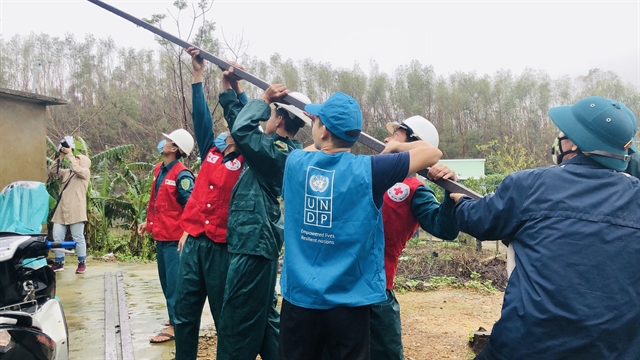 Environment
Environment

The United Nations Development Programme (UNDP) handed over gender-responsive household kits, disinfectants, and equipment for storm and flood monitoring and assessment to people suffering from floods in central Việt Nam.
These supplies are a part of the UNDP’s emergency assistance of US$400,000 to storm- and flood-affected people, with support focused on the poor, near-poor and women in the five most affected provinces of Quảng Bình, Quảng Trị, Thừa Thiên-Huế, Quảng Nam, and Quảng Ngãi.
The support includes 800 gender-responsive household kits, 30 tonnes of disinfectant, five sets of equipment for floods and storm for real-time assessment and monitoring, and repairing 300 damaged houses. The UNDP expects to leverage another $1 million for emergency response and recovery efforts.

|
Central Việt Nam has been impacted by a series of intense storms, cyclones, and record-level floods since early October with more than 230 people reported dead or missing. At least 380,000 houses have been flooded, damaged, or destroyed. In the aftermath, tens of thousands of the most vulnerable have been left with nothing but damaged houses, destroyed livelihoods and ruined crops. Many are being forced to depend upon external support, while further storms are expected to make landfall on the central coast in the weeks ahead.
“We express our heartfelt condolences to the Government and people of Việt Nam for the devastating damage and loss of life you have suffered from the ongoing storms and historic flooding. Now more than ever, affected people, especially the poor, near-poor, women and girls are in need of safe repaired houses to return home to and vital supplies to cope with losses,” said Caitlin Wiesen, UNDP Resident Representative in Việt Nam.

|
| Local authorities and UNDP staff help local people repair houses after being damaged from flood and storms in central Việt Nam. Photo courtesy of UNDP |
Many people have lost almost all of their household possessions to the floodwaters, and many others have become homeless. Poor and near-poor people will not have the means to invest in house repairs, reconstruction, or purchasing necessities.
According to the findings of the three intersectoral joint assessment teams during 21-23 October, of which the UNDP led two, the flood levels and storms have been unprecedented in their scope, causing widespread damage to people and property and affecting the lives and livelihoods of more than 1.5 million people.
Household kits, including kitchen equipment, blanket and mosquito nets, personal protective equipment and disinfectant all help people to protect their health and gradually get back to work.
While house repairs provide a quick fix for families to return to their homes, the UNDP support intends to include specific resilient features, which will help them withstand the impacts of strong typhoons, floods, and climate extreme events to protect people and their household possessions, and these features have already been proven successful through a joint UNDP-Green Climate Fund-Government project on coastal resilience that has been running since 2017.
Following a recent study by the UNDP and the Ministry of Construction, there is a large need of support to build 109,211 resilient houses in 28 coastal areas, of which 24,884 are of urgent need. It is important to replicate and scale-up resilient housing models in Viet Nam, especially for the poor and near-poor in 28 coastal provinces. This requires efforts by the Government, the private sector, individuals and development partners.
“We believe that the more storm and flood resilient houses are built, the less people will suffer from loss and damages, and with safe homes and protected property, the less people will need emergency support in the future. We would like to invite all partners to join with us to build more storm resilient houses to ensure that no one is left behind,” Wiesen highlighted.
"Following floods and storms, ensuring a rapid assessment of damages and needs is critical in order to move quickly and save lives. In this connection, the UNDP is providing essential equipment to five provincial disaster management authorities to improve the assessment and monitoring of flood impacts, including drones and fly-cameras reach areas which are not normally accessible or visible from the ground, and help create risk maps for longer-term risk reduction efforts to avoid needless human suffering," Wiesen added. — VNS




